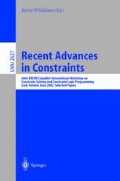Abstract
Experts at modelling constraint satisfaction problems (CSPs) carefully choose model transformations to reduce greatly the amount of effort that is required to solve a problem by systematic search. It is a considerable challenge to automate such transformations and to identify which transformations are useful. Transformations include adding constraints that are implied by other constraints, adding constraints that eliminate symmetrical solutions, removing redundant constraints and replacing constraints with their logical equivalents. This paper describes the CGRASS (Constraint Generation And Symmetry-breaking) system that can improve a problem model by automatically performing transformations of these kinds. We focus here on transforming individual CSP instances. Experiments on the Golomb ruler problem suggest that producing good problem formulations solely by transforming problem instances is, generally, infeasible. We argue that, in certain cases, it is better to transform the problem class than individual instances and, furthermore, it can sometimes be better to transform formulations of a problem that are more abstract than a CSP.
Access this chapter
Tax calculation will be finalised at checkout
Purchases are for personal use only
Preview
Unable to display preview. Download preview PDF.
References
R. Boppana and M. M. Halldórsson. Approximating maximum independent sets by excluding subgraphs. BIT, 32:180–196, 1992.
A. Bundy. A science of reasoning. In J-L. Lassez and G. Plotkin, editors, Computational Logic: Essays in Honor of Alan Robinson, pages 178–198. MIT Press, 1991.
S. Colton. Automated Theory Formation in Pure Mathematics. Springer-Verlag, 2002.
S. Colton and I. Miguel. Constraint generation via automated theory formation. In T. Walsh, editor, Proceedings of the Seventh International Conference on Principles and Practice of Constraint Programming, pages 575–579, 2001.
A.K. Dewdney. Computer recreations. Scientific American, pages 16–20, December 1985.
M.D. Ernst, T.D. Millstein, and D.S. Weld. Automatic SAT-compilation of planning problems. In Proceedings of the 15th International Joint Conference on Artificial Intelligence, pages 1169–1176, 1997.
A.M. Frisch, B. Hnich, I. Miguel, B.M. Smith, and T. Walsh. Towards model reformulation at multiple levels of abstraction. In Proceedings of the International Workshop on Reformulating Constraint Satisfaction Problems, pages 42–56, 2002.
A.M. Frisch, I. Miguel, and T. Walsh. Extensions to proof planning for generating implied constraints. In Proceedings of Calculemus-01, pages 130–141, 2001.
T. Frühwirth. Theory and practice of constraint handling rules. In P. Stuckey and K. Marriot, editors, Journal of Logic Programming, Special Issue on Constraint Logic Programming, volume 37(1–3), pages 95–138, 1998.
A. Ireland. The Use of Planning Critics in Mechanizing Inductive Proof. In Proceedings of LPAR’92, Lecture Notes in Artificial Intelligence 624. Springer-Verlag, 1992. Also available as Research Report 592, Dept of AI, Edinburgh University.
G.F. Luger and W. A. Stubblefield. Artificial Intelligence: Structures and Strategies for Complex Problem Solving. Addison-Wesley, 1998.
S Muggleton. Inverse entailment and Progol. New Generation Computing, 13:245–286, 1995.
J.C. Régin. A filtering algorithm for constraints of difference in CSPs. In Proceedings of the 12th National Conference on AI, pages 362–367. American Association for Artificial Intelligence, 1994.
B. Smith, K. Stergiou, and T. Walsh. Using auxiliary variables and implied constraints to model non-binary problems. In Proceedings of the 16th National Conference on AI, pages 182–187. AAAI, 2000.
B.M. Smith, K. Stergiou, and T. Walsh. Modelling the Golomb ruler problem. In Proceedings of the IJCAI-99-Workshop on Non-Binary Constraints. International Joint Conference on Artificial Intelligence, 1999.
P. van Hentenryck. The OPL Optimization Programming Language. The MIT Press, 1999.
Author information
Authors and Affiliations
Editor information
Editors and Affiliations
Rights and permissions
Copyright information
© 2003 Springer-Verlag Berlin Heidelberg
About this paper
Cite this paper
Frisch, A.M., Miguel, I., Walsh, T. (2003). CGRASS: A System for Transforming Constraint Satisfaction Problems. In: O’Sullivan, B. (eds) Recent Advances in Constraints. CologNet 2002. Lecture Notes in Computer Science, vol 2627. Springer, Berlin, Heidelberg. https://doi.org/10.1007/3-540-36607-5_2
Download citation
DOI: https://doi.org/10.1007/3-540-36607-5_2
Published:
Publisher Name: Springer, Berlin, Heidelberg
Print ISBN: 978-3-540-00986-3
Online ISBN: 978-3-540-36607-2
eBook Packages: Springer Book Archive

